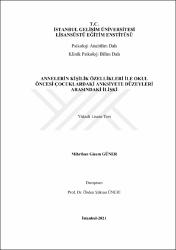Annelerin kişilik özellikleri ile okul öncesi çocuklardaki anksiyete düzeyleri arasındaki ilişki
Özet
Amaç: Çalışmanın amacı annelerin kişilik özellikleri ile okul öncesi çocuklardaki anksiyete düzeyleri arasındaki ilişkinin incelenmesidir. Yöntem: Bu araştırmanın örneklemini oluşturan Özel Bilgi Yuvam Anaokulu, Özel Beylikdüzü Yasemin Anaokulu ve İstanbul Özel Safa Okulları Anaokulu öğrencilerine ve annelerine Sıfatlara Dayalı Kişilik Testi ve Okul Öncesi Çocuklarda Anksiyete Ölçeği uygulanmıştır. Araştırmacı tarafından katılımcıların bilgilerini toplamak amacıyla oluşturulan sosyodemografik veri formu kullanılmıştır. Araştırmanın örneklem grubu 151 okul öncesi dönemi öğrenim gören 3-6 yaş arası öğrencilerden ve öğrencilerin annelerinden oluşmaktadır. Araştırmanın sonucunda elde edilen elde edilen bulgular SPSS 22 (Statistical Pacpage For Social Science) paket programında analiz edilmiştir. Verileri değerlendirirken yüzde, ortalama, standart sapma gibi tanımlayıcı istatiksel metodlar kullanılmıştır. Veriler incelenirken ANOVA, Kruksal Wallis U Test, Bağımsız Gruplar t-test, Levene kullanılmıştır. Bulgular: Araştırma dahilinde sosyodemografik veri formunu ve anket sorularını 70'ini (%46,4) kız çocuğu, 81'inin (%53,6) erkek çocuğu olmak üzere toplamda 151 katılımcı ile çalışılmıştır. Okul Öncesi Çocuklarda Anksiyete Ölçeği (ÖOÇAÖ) sosyal fobi alt boyut puanları ile Sıfatlara Dayalı Kişilik Testi (SDKT) dışa dönüklük (p<,01) duygusal dengesizlik (p<,05) alt boyut puanları, yaygın kaygı bozukluğu alt boyut puanları ile duygusal dengesizlik (p<,05), deneyime açıklık (p<,05) alt puanları, özgül fobi alt boyut puanları ile duygusal dengesizlik (p<,05) alt boyut puanları, ayrılık anksiyetesi alt boyut puanları ile duygusal dengesizlik (p<,01) alt boyut puanları arasında istatistiksel olarak anlamlı bir ilişki olduğu belirlenmiştir. Ayrıca OÖÇAÖ-toplam puanları ile SDKT-duygusal dengesizlik (p<,01) alt boyut puanları arasında istatistiksel olarak anlamlı bir ilişki olduğu, duygusal dengesizlik alt boyut puanları ortalamasının diğer alt boyutlara göre yüksek saptanmıştır. Annelerin demografik özellikleri ile çocuklarındaki kaygı düzeyleri arasında zayıf korelasyonlar tespit edilmiştir. Annelerin kişilik yapıları ile çocuğundaki anksiyete düzeyleri arasında anlamlı ilişkiler tespit edilmiştir. Annelerin 'dışa dönüklük, duygusal dengesizlik, deneyime açıklık' puanlarının çocuklardaki kaygıyı pozitif yönde etkilediği bulunmuştur. Sonuç: Çalışma bulgularımıza göre annelerin kişilik boyutu değişkenleri açısından duygusal dengesizlik kişilik boyutu çocuklarda anksiyeteyi yordayan önemli bir değişkendir. Purpose: The aim of the study is to examine the relationship between the personality traits of mothers and their anxiety levels in preschool children. Method: Adjective Based Personality Test and Preschool Anxiety Scale were applied to the students of Private Bilgi Yuvam Kindergarten, Private Beylikdüzü Yasemin Kindergarten and Istanbul Private Safa Schools Kindergarten and their mothers, which constitute the sample of this research. The sociodemographic data form created by the researcher to collect the information of the participants was used. The sample group of the study consists of 151 pre-school students between the ages of 3-6 and the mothers of the students. The findings obtained as a result of the research were analyzed in the SPSS 22 (Statistical Pacpage For Social Science) package program. While evaluating the data, descriptive statistical methods such as percentage, mean and standard deviation were used. While analyzing the data, ANOVA, Kruksal Wallis U Test, Independent Groups t-test, Levene were used. Results: Within the scope of the research, the sociodemographic data form and questionnaire questions were studied with a total of 151 participants, 70 (46.4%) girls and 81 (53.6%) boys. Preschool Children's Anxiety Scale (PSAS) social phobia sub-dimension scores, Adjective-Based Personality Test (SDKT) extraversion (p<.01), emotional instability (p<.05) sub-dimension scores, generalized anxiety disorder sub-dimension scores and emotional instability (p<.05), openness to experience (p<.05) sub-scores, specific phobia sub-dimension scores and emotional instability (p<.05) sub-dimension scores, separation anxiety sub-dimension scores and emotional instability (p<.01) It was determined that there was a statistically significant relationship between sub-dimension scores. In addition, it was determined that there was a statistically significant relationship between AACS-total scores and SDBT-emotional instability (p<.01) sub-dimension scores, and the average of emotional instability sub-dimension scores was higher than the other sub-dimensions. Weak correlations were found between the demographic characteristics of the mothers and the anxiety levels of their children. Significant relationships were found between the personality structures of the mothers and the anxiety levels of their children. It was found that the scores of mothers' extraversion, emotional instability, openness to experience positively affect children's anxiety. Conclusion: According to our study findings, emotional instability personality dimension is an important variable that predicts anxiety in children in terms of personality dimension variables of mothers.
Bağlantı
https://hdl.handle.net/11363/4826Koleksiyonlar
- Yüksek Lisans Tezleri [1219]
Aşağıdaki lisans dosyası bu öğe ile ilişkilidir:


















